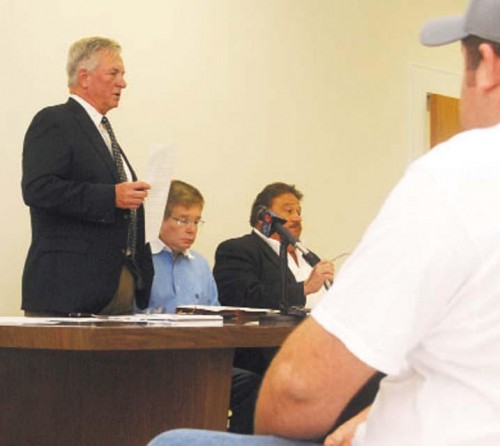New Orleans Museum of Art (New Orleans)
November 29, 2011GCCF doubles seafood payment formula
December 1, 2011A state lawmaker is appealing to the governor’s office for help in achieving solvency for coastal residents who are losing revenue attributable to last year’s BP oil spill yet haven’t received their “due payments” from the Gulf Coast Claims Facility.
Rep. Joe Harrison, R-Gray, announced last week a resolution requesting Gov. Bobby Jindal to “force mediation” for unsettled claims. More than 30 fishermen and a handful of local and state officials attended a press conference in Gray to hear Harrison outline his plan that would give frustrated claimants “two bites at the apple.”
First, people with pending claims would be allowed to sit in with a mediator and receive an offer without a take-it-or-leave-it atmosphere, allowing the claimant to make a thoughtful choice, the lawmaker said. Second, the state would make available resources, such as economic development staffers to pore over documents, to those who claim damages.
“It’s not right that we have people who are depending on the legal side of the page not to have some sort of semblance of what’s going on,” Harrison said. “’Where am I? What can I expect? How long is it going to take?’ I don’t want them to make hardcore promises; I just want (GCCF) to do something for the people who are out there suffering day in and day out.”
People in the wide-berthed fishing industry, including dock owners, wholesalers and the fishermen themselves of multiple seafood subsets, have said attorneys aren’t returning calls and settlement offers are insultingly meager, Harrison said.
And while the industry struggles to recoup damages, creditors and bill collectors are staying in touch with the fishermen and descending upon financed assets. Harrison called this the “misery factor.”
“(Attorneys) need to give (claimants) that opportunity to come in and talk about their case, so they know where they are so that they can tell their families and their bankers or whoever they have that they owe money to that this is what they can expect,” Harrison said. “So we can give you a piece of information that you can hold off some of those people that are after you that don’t deserve to be after you because of this incident.”
Terrebonne Parish Dist. 7 Councilman-elect Danny Babin, who is the general manager of seafood-processor Gulf Seafood Inc, said fishermen were impacted the most by the spill, so they should be paid first.
“I’m experiencing the exact same thing that each and every one of you are experiencing,” Babin said. “We’re getting the double talk from (GCCF Administrator Kenneth) Feinberg. They’re saying they’re losing paperwork. It’s not just one segment of the industry. It’s the entire industry.”
GCCF offers claimants three options: gamble that the future of the Gulf will return strong and accept a final payment, which doubles losses from 2010; return to GCCF offices each quarter with documented losses from the period and accept an interim payment; or accept a quick payment worth $5,000 for individuals and $25,000 for businesses.
In the case of fisheries, uncertainty over the Gulf’s future has led claimants to rely on interim payments to stay afloat. But those in the industry have complained that the interim payment methodology is misguided and tilts the scale against them.
Samantha Luke, co-owner of P&S Seafood, a crab wholesaler and retailer, said damages to her business total about $342,000. She was offered $46,000 as an interim payment, which she reluctantly accepted.
“How do you keep a business running with that little amount?” Luke said. “We’ve thought about closing our doors many, many times.”
Luke said the poundage of crab supply is down, which means less profit.
The GCCF compared May through December of 2009 and 2010 to January through March of 2011 to determine Luke’s payment, she said.
Although mediation would not immediately solve GCCF’s process for gauging losses, it would permit Luke to sit down in a non-binding environment, evaluate an offer and make a decision.
Harrison said he believes the resolution will receive unanimous backing from legislators, and then Jindal would be free to issue an executive order prior to the next lawmaking session, which doesn’t begin until March.
GCCF is also tinkering with the methodology for paying fisheries claims, Harrison said. The lawmaker said a preliminary draft of changes should be forthcoming, and he would consult with those in the industry to request further alterations.
At least a portion of the methodology issue is that the GCCF is not taking into consideration that four hurricanes and lax regulations on imported seafood have hurt south Louisiana’s fishing economy, Terrebonne Parish President Michel Claudet said.
“My experience has been that they don’t understand the shrimping industry,” Claudet said. “They understand Florida condos.”
If Jindal grants the order, Harrison said, fishermen with pending claims would be contacted, as will attorneys representing swaths of the industry.
“It’s just a good opportunity for us to try to do some of the things I think we should be doing,” Harrison said. “I’m trying to force a project through right now. I’m trying to get the help of the BP people and the help of the other people involved.”
Dean Blanchard, owner of a large seafood supply company in Grand Isle, urged the fishermen in attendance to not accept a final payment because of the murky future.
“We need interim money,” Blanchard said. “We need BP to give us some money and put it in the business, because how can you make a final determination when you don’t know what you’re looking at? If it all gets better, we’ll go back to work; we don’t need money from BP. But if it don’t get better, at least you didn’t sign your rights away if they can give you enough money to survive the loss.”
Both unsettled claimants and BP have criticized the GCCF, which is administering BP’s $20 billion claims fund for damages stemming from the 2010 Deepwater Horizon Oil Spill.
In Louisiana, 4,857 individual fishing claims have been paid at a total of $61.5 million, an average claim of $12,651, which is more than any other industry average.
For businesses in the state, 8,646 fishing claims totaling $303.8 million have been paid. The average payout of $35,137 makes fishing the third highest industry, only less than seafood processing and distribution ($136,000 per claim) and food, beverages and lodging ($40,800 per claim).
Overall, GCCF has satisfied 11,462 individual fishing claims and 18,586 business fishing claims at $134.3 million and $596.8 million, respectively. Subtracting Louisiana totals from those figures, the average claim amounts in other states are $20,333 for individuals and $29,476 for businesses.
In total, Louisiana residents have collected about $1.75 billion in claim payouts, according to the GCCF website.
State Rep. Joe Harrison, joined by Terrebonne Parish President Michel Claudet and state Rep. Gordy Dove addresses people from the region’s fisheries industry at a press conference. ERIC BESSON












